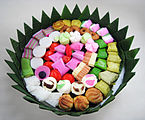 Pandan cake | |
| Alternative names | Pandan chiffon cake[1][2] |
|---|---|
| Type | Cake |
| Region or state | Southeast Asia |
| Associated cuisine | Malaysia,[3] Indonesia,[4] Singapore[4] |
| Main ingredients | Juice of pandan leaves or Pandanus extract, flour, eggs, sugar, butter or margarine |
Pandan cake is a light, fluffy, green-coloured sponge cake[5] flavoured with the juices of Pandanus amaryllifolius leaves.[6][7] It is also known as pandan chiffon.[1][2] The cake is popular in Malaysia, Indonesia, Singapore, Vietnam, Cambodia, Laos, Thailand, Sri Lanka, Hong Kong, China, and also the Netherlands.[8][9][10][4] It is similar to the buko pandan cake of the Philippines, but differs in that it does not use coconut.
Ingredients[edit]
The cake shares common ingredients with other cakes, which includes flour, eggs, butter or margarine, and sugar. However, the distinct ingredient is the use of pandan leaf, which gives the cake its distinct green colouration. The cakes are light green in tone[11] due to the chlorophyll in the leaf juice. It sometimes contains green food colouring to further enhance its colouration. The cakes are not always made with the leaf juice, as they can be flavoured with Pandanus extract, in which case colouring is only added if a green colouration is desired.[12]

The original pandan cake common in Indonesia, the Netherlands, and Singapore is a usually soft sponge cake akin to the light and fluffy chiffon cake, made without any additional coating or frosting.[2][13] The other variants are actually derived from other cake recipes, with any similarity only in the usage of green pandan flavouring extract.
History and origin[edit]
In Southeast Asia, cake-making techniques were brought into the region through European colonization. Malaysia and Singapore were British possessions, whilst Indonesia was formerly a Dutch colony. European colonists brought their cuisine along with them, with the most obvious impacts in bread, cake, and pastry-making techniques.[14] In Southeast Asian cuisine, the pandan leaf is a favourite flavouring agent used to give off a pleasant aroma, and added to various dishes ranging from fragrant coconut rice, traditional cakes, to sweet desserts and drinks.[15] It was the fusion of European cake-making techniques with locally grown ingredients that created the pandan-flavoured cake.
In 2017 CNN named the pandan cake as the national cake of Singapore and Malaysia.[4] This has led to reactions in Indonesia that regarded the pandan cake, locally known as kue bolu pandan, as Indonesian. In Singapore pandan cake was popularised by one of the city's most popular bakeries, Bengawan Solo,[13] a cake shop owned by a Singaporean citizen of Indonesian origin.[3]

According to CNN Indonesia, this cake originated from Indonesia, which can be traced to the cake-making techniques of Dutch colonists in the Dutch East Indies (now Indonesia).[3] The colonial Dutch and Indo peoples combined cake-making techniques from Europe with the available local ingredients like the pandan leaf as flavouring and colouring agents. This cake is also known as pandan cake in Dutch, and is quite popular in the Netherlands due to its historical link to Indonesia. Other than its use in chiffon pandan cake, pandan leaf is also used as green colouring and flavouring in the Dutch-Indonesian favourite pandan spekkoek or lapis legit (layered cake), demonstrating the prominence of pandan leaf in Dutch-Indonesian cake and pastry making.[16]
Names in different languages[edit]

- Malaysian: kek pandan
- Indonesian: bolu pandan
- Dutch: pandan cake
- Khmer: Num Sleok Touy
- Vietnamese: Bánh pho sĩ, "bánh lá dứa"
- Cantonese: Chinese: 班蘭蛋糕; Cantonese Yale: baan1 laan4 daan6 gou1
- Thai: เค้กใบเตย
See also[edit]
References[edit]
- ^ a b Quek, Eunice (30 April 2017). "Is pandan chiffon cake Singapore's national cake?". The Straits Times. Retrieved 20 May 2020.
- ^ a b c "Chiffon Cake Pandan". Holland Bakery. Retrieved 2020-05-20.
- ^ a b c "Mengurai Huru-hara Kue Pandan Singapura". CNN Indonesia (in Indonesian). Retrieved 2020-05-20.
- ^ a b c d Zoe Li; Maggie Hiufu Wong (3 April 2017). "Cakes of the world: Tiramisu, baklava, cheesecake and more national treats". CNN. Retrieved 2020-05-20.
- ^ Hemphill, John; Hemphill, Rosemary (1997). What Herb Is That?. p. 127. ISBN 9780811716345. Retrieved 29 December 2014.
- ^ Jacob, Jeanne; Ashkenazi, Michael (15 January 2014). The World Cookbook. p. 615. ISBN 9781610694698. Retrieved 29 December 2014.
- ^ "Cheap Sweets: Pandan Chiffon". LA Weekly. 22 December 2014. Retrieved 29 December 2014.
- ^ Jeff Keasberry (18 March 2015). "Pandan Cake Pops". Archived from the original on 16 January 2018. Retrieved 21 April 2017.
- ^ "Pandan Chiffon Cake". Asian Inspirations. 29 October 2017.
- ^ "Pandan Chiffon Cake". Asian recipe. Archived from the original on 2018-01-16. Retrieved 2018-01-16.
- ^ Castella, Krystina (January 2010). A World of Cake. p. 288. ISBN 9781603425766. Retrieved 29 December 2014.
- ^ "Recipe: Pandan chiffon cake with coconut glaze". Los Angeles Times. May 5, 2011. Retrieved November 5, 2011.
- ^ a b "Welcome to Bengawan Solo". www.bengawansolo.com.sg. Archived from the original on 2020-05-04. Retrieved 2020-05-20.
- ^ Luke Nguyen (5 December 2016). "Crocodile bread and spekkoek: the tasty intersection of Dutch-Indo food". SBS.
- ^ Jeanne Jacob; Michael Ashkenazi (2014). The World Cookbook: The Greatest Recipes from Around the Globe, 2nd Edition (4 Volumes): The Greatest Recipes from Around the Globe. ABC-CLIO. p. 615. ISBN 9781610694698.
- ^ "Layered cake pandan". Belimpex. Retrieved 2020-05-20.
